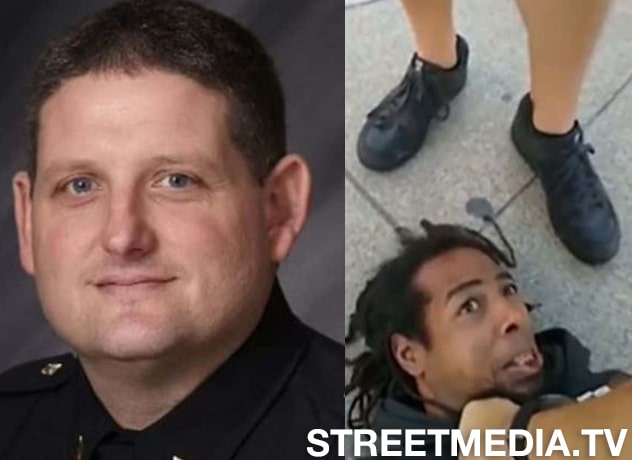Indianapolis Police Sergeant Faces Federal Charges for Assaulting Homeless Man

In recent times, the power of social media and the ubiquity of smartphones have brought to light numerous incidents of police brutality that might otherwise have remained hidden. One such incident that shook the nation involved an Indianapolis police sergeant who now faces federal charges for stomping on a handcuffed homeless man’s face. The video, captured on a bodycam, quickly went viral, igniting widespread outrage and raising important questions about police accountability and the treatment of vulnerable populations. This blog post aims to delve into the details of this distressing incident, analyze its implications, and discuss the urgent need for reform in law enforcement. This Police Sergeant stomping a homeless man is a prime example of whats wrong with policing in America.
The incident in question unfolded on a fateful day when a homeless man, whose identity remains undisclosed, encountered a routine police patrol in downtown Indianapolis. The encounter escalated rapidly, resulting in the man’s arrest and subsequent mistreatment by Sergeant Eric Huxley, an officer with a previously unblemished record.
The damning evidence came to light through the body camera footage worn by Sergeant Huxley himself. The video, widely shared across social media platforms, showed the officer callously stomping on the face of the handcuffed and defenseless man, who was lying prone on the ground. The shocking brutality of the act, coupled with the victim’s vulnerable status as a homeless individual, sparked a wave of public outrage and condemnation.
As news of the incident spread, calls for justice grew louder. Federal authorities quickly launched an investigation into the matter, resulting in Sergeant Huxley’s indictment on charges of excessive use of force and violation of the homeless man’s civil rights. If convicted, he could face severe penalties, including imprisonment and the loss of his law enforcement credentials.
The viral nature of the video prompted widespread protests and demands for police accountability in Indianapolis and beyond. Community leaders, activists, and advocacy organizations organized rallies, seeking to amplify the voices of marginalized groups, raise awareness about the incident, and push for meaningful reform. The case drew attention to broader issues within law enforcement, highlighting the urgency of addressing systemic biases and improving police training.
>> Indianapolis Police Sergeant Eric Huxley Faces Federal Charges for Assaulting Homeless Man!
This appalling incident serves as a stark reminder that police brutality continues to be a pervasive issue within our society. It exposes the vulnerability of marginalized communities, such as the homeless, who often suffer from a lack of access to legal representation and are disproportionately affected by systemic injustices.
The incident of the Police Sergeant stomping homeless man in the head, also underscores the importance of body-worn cameras as tools for accountability. These devices provide an unfiltered record of police interactions, ensuring that incidents of abuse can be properly documented and investigated. However, the mere presence of bodycams is not enough; their footage must be thoroughly reviewed, and appropriate action must be taken when misconduct is discovered.
To address these systemic issues, comprehensive reform within law enforcement is imperative. First and foremost, departments need to prioritize the thorough and unbiased investigation of all allegations of police misconduct. Accountability measures, such as independent review boards and stricter disciplinary processes, should be established to ensure that officers are held responsible for their actions. Additionally, increasing transparency through the release of relevant data and statistics can help identify patterns of abuse and facilitate evidence-based reforms.
Furthermore, police training programs should prioritize de-escalation techniques, empathy, and cultural sensitivity. Enhancing the understanding of officers about the communities they serve can foster better relationships, reduce the use of force, and prevent instances of unnecessary violence. Furthermore, increasing collaboration between law enforcement agencies and community organizations can promote trust and facilitate dialogue, leading to more effective policing strategies.
The viral video capturing the Indianapolis police sergeant stomping on a handcuffed homeless man’s face has sparked outrage and ignited a national conversation about police brutality and the urgent need for reform. The incident serves as a painful reminder of the power dynamics at play within law enforcement and the dire consequences that marginalized communities often face.
Moving forward, it is crucial for society to demand accountability from those entrusted with public safety. It is the responsibility of law enforcement agencies, policymakers, and community leaders to work collaboratively to implement lasting change. This change should involve robust oversight mechanisms, thorough investigations, and unbiased disciplinary processes to ensure that officers who abuse their power are held accountable.
Moreover, investing in community-oriented policing approaches, such as increased training in de-escalation techniques and cultural sensitivity, can help bridge the gap between law enforcement and the communities they serve. By building trust, fostering dialogue, and addressing the root causes of social issues, we can work towards a future where incidents of police brutality are minimized, and public safety is prioritized alongside the respect and dignity of all individuals.
The viral video of the Indianapolis police sergeant’s assault on a handcuffed homeless man’s face should serve as a wake-up call for society. It is a reminder that we must continue to push for meaningful change in our criminal justice system. By advocating for reform, supporting community organizations, and holding our elected officials accountable, we can strive towards a more just and equitable society, where the fundamental rights and well-being of all individuals are respected and protected.



